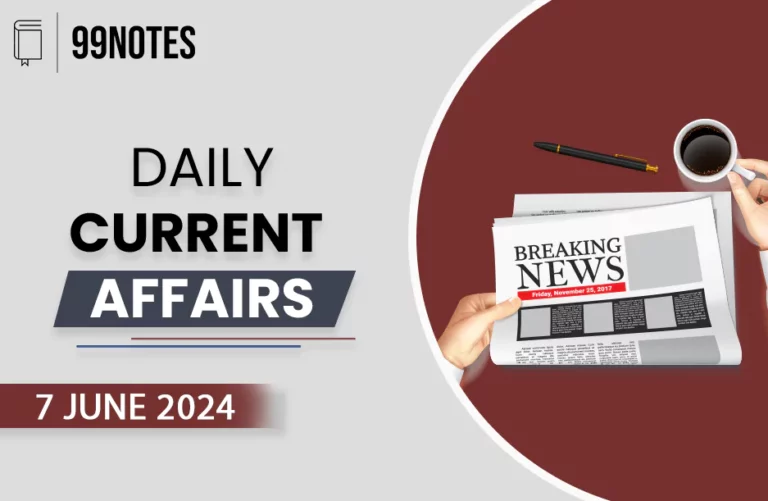24 Feb 2024 : Daily Current Affairs
Daily Current Affairs
24-February-2024- Top News of the Day
1. India Amends Surrogacy Rules, Allowing Use of Donor Gametes: Implications and Controversies
| Topic: GS2 – Governance – Government policies – Issues arising out of their design & implementation GS2 – Social Justice – Health This topic is relevant for both Prelims and Mains in the context of the amendment to surrogacy rules which reflects changes in societal norms and values regarding reproductive rights, single parenthood, and family structures. |
| Context: |
|
More about the news:
Implications of the Amendment:
- Before the March 2023 ban, surrogacy rules permitted the use of donor eggs but not sperm.
- The amendment opens up surrogacy options for older women and those unable to produce eggs due to medical conditions.
- Experts view this as a positive step, especially for older women who may require donor eggs due to declining egg quality with age.
Contentions Regarding Surrogacy for Single Women:
- The current regulations limit access to surrogacy for single women to those who are widowed or divorced, and even in these cases, the use of the woman’s own eggs is mandated.
- A 44-year-old unmarried woman has challenged these provisions in the Delhi High Court, arguing against the association of marital status with surrogacy eligibility and advocating for the use of donor eggs, which is recommended at her age.
Intended Recipients of Surrogacy:
- Surrogacy primarily serves women with missing or abnormal uteruses, those who have undergone surgical removal of the uterus, or those with conditions preventing them from carrying a pregnancy to term.
- It may also be an option for women who have failed multiple rounds of IVF or have thin endometrial linings, making pregnancy challenging or life-threatening.
Medical Considerations and Caution:
- While surrogacy can address specific medical challenges, experts caution against its unnecessary use due to potential complications.
- These include the child inheriting the surrogate’s immune system, lack of initial breastfeeding, and the influence of the surrogate’s womb environment on the child’s long-term health.
- Consequently, surrogacy should be pursued only when medically necessary and after thorough consideration of potential risks and benefits.
| What is surrogacy? |
Who is involved?
Why would one need to use surrogacy?
What types of surrogacies are there?
Gestational surrogacy
What types of surrogacy arrangements are there?
Commercial surrogacy
|
| Practice Question: Discuss the recent amendments to surrogacy rules in India and their implications for women’s reproductive rights, healthcare policies, and societal norms. Analyze the ethical considerations surrounding surrogacy regulations and evaluate the potential impact of these amendments on the Indian healthcare system and gender equality. (250 words/15 m) |
2. Assam Cabinet Repeals Outdated Muslim Marriage Registration Act, Paving the Way for Uniform Civil Code
| Topic: GS2 – Governance – Government policies – Interventions for development in various sectors This topic is relevant for both Prelims and Mains in the context of knowing facts about the decision to repeal an outdated colonial-era law which underscores the evolving societal norms and the need for legal reforms to address contemporary social issues. |
| Context: |
|
More about the news:
Significance of the Decision:
- This repeal, aimed at facilitating the transition towards a UCC, is particularly noteworthy considering Assam’s demographic landscape, with Muslims comprising 34% of the state’s population according to the 2011 Census.
- The Act, which previously allowed marriage registration for underage individuals, has been a subject of scrutiny, especially concerning the prevalence of child marriages in the state.
Provisions and Repercussions:
- Under the repealed Act, Muslim marriages and divorces were registered by authorized registrars, perpetuating practices deemed incompatible with contemporary societal norms.
- As per the government the Act contributed to the registration of underage marriages, emphasizing the government’s commitment to eradicating child marriage through legislative measures.
Government’s Actions and Future Plans:
- Following the repeal, the District Commissioners will assume control over the registrars previously operating under the Act, with a one-time financial compensation of Rs 2 lakh allocated to them.
- Chief Minister Himanta Biswa Sarma reiterated the government’s dedication to implementing a UCC, alongside efforts to combat polygamy through legislative interventions.
Implications for Tribal Communities:
- The state’s tribal communities would be exempt from the UCC, addressing concerns regarding the compatibility of uniform civil laws with tribal customs and traditions.
- While the anti-polygamy Bill was expected to be introduced in the ongoing Assembly session, its alignment with the UCC suggests a nuanced approach towards legal reforms in Assam.
| What is the Uniform Civil Code? |
About:
Supreme Court of India Stance on UCC:
Jose Paulo Coutinho v. Maria Luiza Valentina Pereira Case, 2019:
Law Commission’s Stance:
|
| PYQ: Consider the following provisions under the Directive Principles of State Policy as enshrined in the Constitution of India: (2012) 1) Securing for citizens of India a uniform civil code 2) Organising village Panchayats 3) Promoting cottage industries in rural areas 4) Securing for all the workers reasonable leisure and cultural opportunities Which of the above are the Gandhian Principles that are reflected in the Directive Principles of State Policy? (a) 1, 2 and 4 only (b) 2 and 3 only (c) 1, 3 and 4 only (d) 1, 2, 3 and 4 Ans: (b) |
| Practice Question: Discuss the significance of the Assam Cabinet’s decision to repeal the Assam Muslim Marriage and Divorce Registration Act, 1935, in the context of advancing towards a Uniform Civil Code (UCC) in the state. (250 words/15 m) |
3. ISRO: PAPA detects solar wind impact of coronal mass ejections
| Topic: GS3 – Science and Technology – Space Crucial for UPSC as it highlights India’s space capabilities in monitoring solar phenomena, aligning with science and technology syllabus. |
| Context |
|
Additional information on this news:
- ISRO’s Aditya-L1 satellite’s Plasma Analyser Package for Aditya (PAPA) payload detected the impact of coronal mass ejections (CMEs).
- PAPA, an energy and mass analyser, consists of Solar Wind Electron Energy Probe (SWEEP) and Solar Wind Ion Composition Analyser (SWICAR) sensors.
- SWEEP measures electrons (10 eV to 3 keV), while SWICAR measures ions (10 eV to 25 keV, mass range 1-60 amu), both equipped to determine the direction of arrival of solar wind particles.
- Operational since December 12, 2023, PAPA’s recent observations during February 10-11, 2024, highlight its effectiveness in monitoring space weather conditions and analyzing solar phenomena.
| More about Aditya L-1 Mission |
○ Understand the Sun’s corona and its heating mechanisms. ○ Study solar flares and coronal mass ejections (CMEs) that impact Earth’s magnetosphere and can disrupt satellites and power grids. ○ Improve our ability to predict space weather events.
○ Imaging telescopes to observe the Sun’s corona and chromosphere. ○ Spectrometers to analyze the Sun’s composition and temperature. ○ A coronagraph to block out the Sun’s bright disk and study the faint corona.
○ Understand the Sun’s influence on Earth’s climate and space environment. ○ Develop better space weather forecasting models to protect satellites and infrastructure. ○ Advance our understanding of stellar physics. This ambitious mission marks a significant step forward in India’s space exploration journey and contributes to our understanding of the Sun, the star that sustains life on Earth. |
4. Israel seeks open-ended control in post-war Gaza
| Topic: GS3 – International Relations The Israeli-Palestinian conflict, Netanyahu’s plan, and U.S. involvement are critical for UPSC due to global geopolitical implications and diplomatic challenges. |
| Context |
|
Additional information on this news:
- Israel’s Post war Plan for Gaza:
- Prime Minister Benjamin Netanyahu proposes open-ended control over security and civilian affairs in the Gaza Strip.
- The plan was swiftly rejected by Palestinian leaders.
- It contrasts with the U.S. vision, which seeks eventual Palestinian governance in Gaza and the West Bank as a precursor to statehood.
- Netanyahu’s plan envisions hand-picked Palestinians in Gaza administering the territory, opposing full Palestinian statehood.
- Ceasefire efforts are ongoing, with mediators set to present a new proposal in Paris.
- Ceasefire Situation:
- S., Egypt, and Qatar face an unofficial deadline before the Muslim holy month of Ramzan to find a formula to halt Israel’s offensive in Gaza.
- Israeli airstrikes overnight killed at least 68 Palestinians, bringing the overall death toll to over 29,500, with close to 70,000 wounded.
- Gaza health officials report the death toll represents close to 1.3% of Gaza’s population of 2.3 million.
- Netanyahu’s Vision:
- Netanyahu’s plan lacks specifics but emphasizes Israel’s determination to crush Hamas, the group that took control of Gaza in 2007.
- It envisions local officials governing Gaza, not associated with entities supporting terrorism and not receiving payments from them.
- The plan is the first formal post-war vision presented by Netanyahu.
- Public Friction:
- Deep disagreements between Israel and the U.S. regarding Gaza’s future contribute to public friction.
- The Biden administration seeks Palestinian governance in Gaza and the West Bank, a stance opposed by Netanyahu’s right-wing government.
- Ceasefire and Diplomacy:
- Ceasefire efforts gain traction, with a new proposal expected to be presented at a high-level meeting in Paris.
- The U.S., Egypt, and Qatar have been involved in mediation.
- Casualties:
- Israeli airstrikes killed at least 68 Palestinians, including children and women, with 24 bodies remaining trapped under the rubble.
- Overall Palestinian death toll exceeds 29,500, and close to 70,000 are reported wounded in Gaza since the start of the conflict.
- Hamas Elimination Goal:
- Netanyahu’s plan emphasizes the goal of eliminating Hamas, the militant group controlling Gaza since 2007.
- Critics argue that this goal is considered unattainable, and polls suggest that a majority of Palestinians don’t support Hamas.
5. Govt. eases electricity consumer rules to hasten rooftop solar installations
| Topic: GS2 – Governance – Government policies Reforms in Power Ministry enhance consumer rights, streamline solar energy adoption, aligning with UPSC focus on governance and sustainability. |
| Context |
|
Additional information on this news:
- The Power Ministry has simplified electricity consumer rules, reducing the time for new connections and streamlining rooftop solar installations, with separate connections for EV charging.
- Amendments empower multi-storied flat residents to choose connection types, ensuring separate billing for common areas in residential societies, enhancing transparency.
- Check meters will be installed by distribution companies to verify electricity consumption upon consumer complaints.
- Distribution system strengthening for RTS PV systems up to 5 kW will be done by the discom at its cost, and the commissioning timeline cut from 30 to 15 days.
- Owners in co-operative group housing societies can choose individual or single-point connections through a transparent ballot.
- Parity in tariffs for single-point and individual connections; separate metering, billing, and collection for individual consumption, backup power, and common areas.
- Discoms required to install an additional meter within five days for consumer complaints about meter readings not aligning with actual consumption.
- Minister R. K. Singh emphasizes consumer interest, referencing the Electricity (Rights of Consumers) Rules, 2020, setting service standards for discoms nationwide.
| Importance of promotion to rooftop solar panels |
Importance:
○ Generates clean electricity, reducing reliance on fossil fuels and combating climate change. ○ Lowers carbon footprint and promotes sustainable living.
○ Saves on electricity bills through self-generated power. ○ Increases property value due to energy efficiency. ○ Creates jobs in installation, maintenance, and manufacturing.
○ Reduces dependence on the traditional grid and vulnerability to power outages. ○ Increases energy security and reliability. Challenges in Promotion:
Way Forward:
Public Awareness Campaigns:
|
| PYQ: India has immense potential of solar energy though there are regional variations in its development. Elaborate. (250 words/15m) (UPSC CSE (M) GS-1 2020) |
| Practice Question: Critically examine the challenges and potential of rooftop solar panels in India, suggesting measures to promote their widespread adoption. (150 words/10 m) |
For Enquiry

24 Feb 2024 : Daily Answer Writing

24 Feb 2024 : Daily Current Affairs

24 February 2024 : The Hindu Editorial Notes PDF

24 Feb 2024 : Indian Express Editorial Analysis

24 February 2024 : PIB Summary for UPSC

23 Feb 2024 : Daily Current Affairs Quiz

23 Feb 2024 : Daily Answer Writing

23 Feb 2024 : Daily Current Affairs

23 February 2024 : The Hindu Editorial Notes PDF

23 February 2024 : PIB Summary for UPSC
mains answer writing 24 Feb 2024 : Daily Answer Writing Mains Answer Writing
24-February-2024
Q1) “The true function of a legislature is to discuss and…
Daily Current Affairs 24 Feb 2024 : Daily Current Affairs Daily Current Affairs
24-February-2024- Top News of the Day
1. India Amends Surrogacy Rules, Allowing…
Feb 2024 The Hindu 24 February 2024 : The Hindu Editorial Notes PDF The Hindu Editorial
24-February-2024
1. Courts must act against governments issuing blocking orders…
Indian Express 24 Feb 2024 : Indian Express Editorial Analysis Indian Express Editorial Analysis
24-February-2024
1. A war of attrition
Topic: GS2 – International…
feb 2024 PIB 24 February 2024 : PIB Summary for UPSC PIB Summary for UPSC
24 February -2024
1. President’s greetings on the eve of birth anniversary…
Daily Quiz 23 Feb 2024 : Daily Current Affairs Quiz 23 Feb 2024 : Daily Quiz…
mains answer writing 23 Feb 2024 : Daily Answer Writing Mains Answer Writing
23-February-2024
Q1) Though President of India is the constitutional head of the…
Daily Current Affairs 23 Feb 2024 : Daily Current Affairs Daily Current Affairs
23-February-2024- Top News of the Day
1. Escalating Farmer Protests: Challenges…
Feb 2024 The Hindu 23 February 2024 : The Hindu Editorial Notes PDF The Hindu Editorial
23-February-2024
1. The government must keep the regulatory environment of space…
feb 2024 PIB 23 February 2024 : PIB Summary for UPSC PIB Summary for UPSC
23 February -2024
1. With a focus on promotion of organic exports, APEDA forms…




